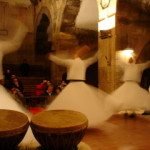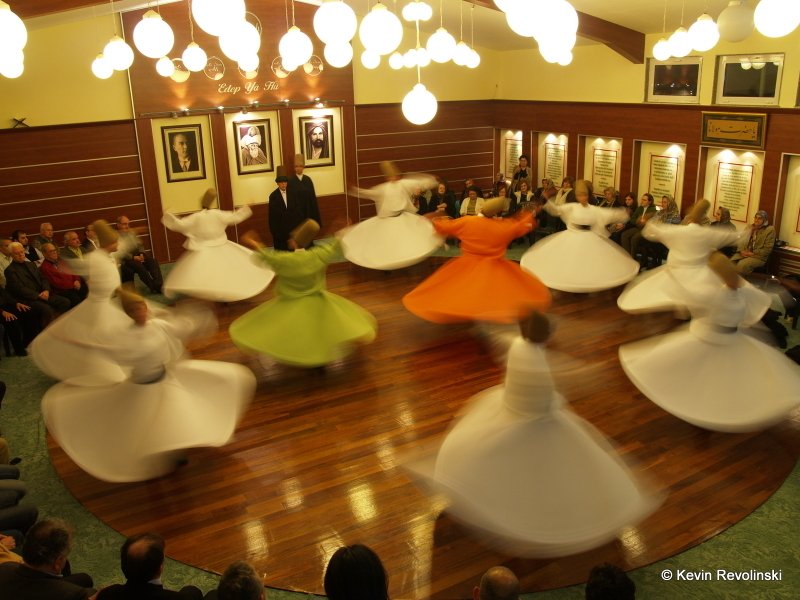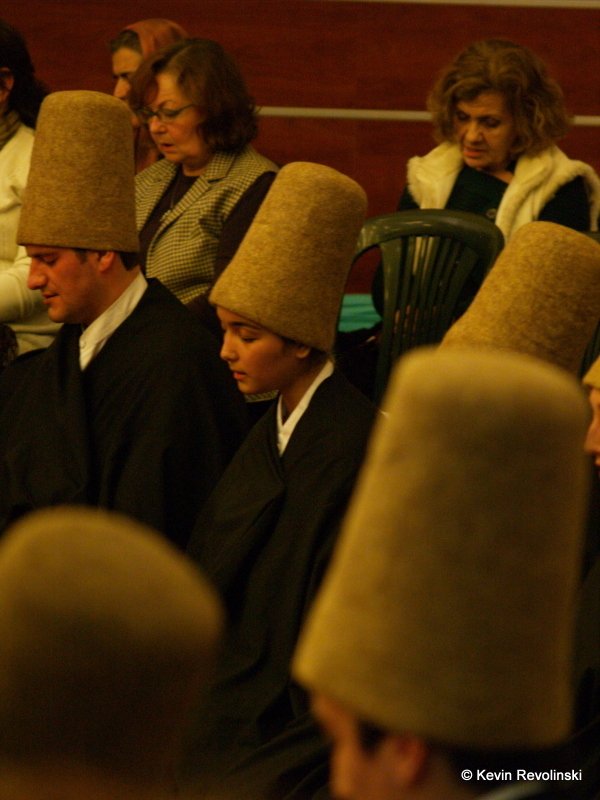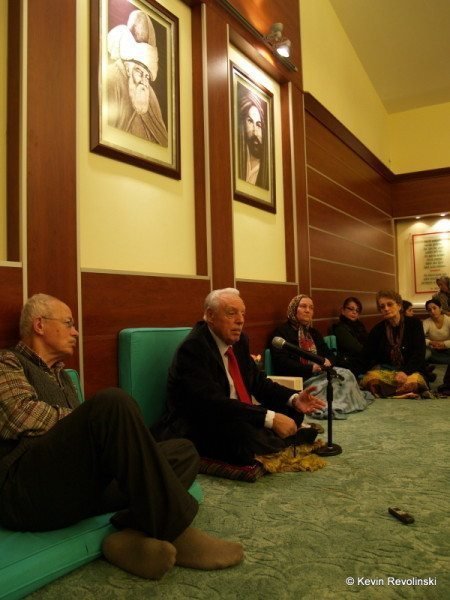Women as Dervishes in Turkey
Right away the observer notices there is something not quite normal about this whirling dervish group. Two of the members in the center stand out; one with a bright orange dress, the other with a lime green skirt twirling about. But there’s something else. When I peer into the turning faces—faces lost in some sort of spiritual ecstasy, eyes half-closed or focused on something far beyond this room—I can see that several of the dervishes are women. With their hair tucked up beneath the sikkes, the tall camel hair hats meant to symbolize the tombstone of the ego, they really don’t appear any different from the men. But rest assured this little difference has not gone unnoticed in the dervish community and among Muslims in general.
Sevtap Demirtaş walks with me through the dim streets of Silivrikapi, a neighborhood on the European side of Istanbul. We are on our way to a meeting of The Foundation of Universal Lovers of Mevlana Jelaluddin Rumi, a contemporary dervish group allowing women to take part. I ask her how she has arrived at being a dervish.
Sevtap hadn’t been able to find herself in Islam when she was younger. “I covered my hair for a short time in high school. I had lessons to read the Q’uran in Arabic, but it was nonsense for me; I didn’t understand because I am Turkish. Something must be clear: a pure heart. Someone had to clean me.”
“Fourteen years ago I started looking for someone,” she says. “If there is a god, he must speak with me. I must have a relationship.” She compares her fourteen years of searching to a washing machine spin cycle. She “changed everything” leaving a university graduate program in Izmir to come to Istanbul. She met Hasan Dede and everything fell into place. “I looked in his eyes and I started to cry. He answered me before I even asked questions. And then I understood that he was my spiritual guide.” She now works with a non-profit organization that helps the blind. Learning to perform the whirling meditation took her six months. Her previous smoking habit made it difficult. She quit during the process.
In Istanbul’s Silivrikapı district on the European side lies a simple meeting hall—modern, well lit, carpeted. It could be the basement of an elementary school. But under the direction of spiritual leader Hasan Dede, a community of men and women is growing together and seeking the spiritual path of Mevlana.
The whirling dervish ceremony is known as the Sema. Mevlana Celaleddin Rumi, a Sufi mystic, settled in what is present-day Konya, Turkey and was then part of the Ottoman Empire. He developed the spinning meditation by which the dervish goes on a mystical journey, leaving ego behind and ascending in mind and love to Allah. After the experience he returns changed, more mature, and inclined to love and to be of service to the whole of creation. Rumi’s followers kept the tradition alive after his death in 1273 and even today the whirling dervishes are famous far beyond the world of Sufism.
Hasan is a white-haired man wearing a blue corduroy suit and a red tie. Prayer beads pass through his fingers as he sits on a pillow at the front of the hall. Women outnumber the men as the crowd continues to grow during his introductory sermon about the difference between human and divine love. By the end of the hour, more than 120 are gathered, and more than half of them are women. Only a few of them cover their hair, but when the prayer begins—and the men and women pray together—all of them pull out scarves. Sevtap calls it a matter of comfort as is the night’s seating of women on one side of the room facing the men from the side. But they all face their spiritual master as they pray. With heads wagging, they all begin to chant “Allah! Allah! Allah!” creating a passionate crescendo. After prayers, the room is prepared for the dancers. Carpeting is removed to reveal a gleaming wooden circle in the center of the hall.
On the front wall are three portraits: one of Rumi, another of Ali and a third of the first president and founder of the modern Turkish Republic, Mustafa Kemal Atatürk. This is an intriguing juxtaposition. Atatürk actually outlawed the practice and dress of the dervishes in 1923 in his efforts to create a secular state. On their web site, the Foundation cites the opening words of Atatürk’s speech to the Turkish Parliament—”God is one; he is great” — and claims he “touched on the subject of religion a few times” in other speeches.
I ask Hasan about the photo. “Mustafa Kemal Atatürk is the same as the Prophet Mohammed for us. He is not on the wall; he is in our hearts.” Dede and his followers feel Atatürk was a religious man, and like most Turks, they like to quote him. Dede does so now: “Peace at home; peace in the world.” He alleges that Ataturk’s philosophy fits well with that of Rumi. Rumi welcomed people of all backgrounds to take part in the spiritual journey. Dede quotes him as well: “Come here, whoever you are.”
It’s that blindness to discrimination that led Hasan to start teaching women the Sema in 1993. Hasan Dede is not just some upstart either. Born in 1935 in Skopje, Macedonia, he received a religious education and was trained as a muezzin before moving with his family to Istanbul in the late 1950s. After finding his own spiritual guide and becoming a true follower of Mevlana, he had the high honor of leading the dervish ceremonies in Konya. And in 1993, the previous leader of ceremonies passed on an honored item once used by Rumi himself, a red ceremonial sheepskin.
But Hasan knows none of this appeases the naysayers. “This group is controversial. Men and women pray and worship together. No discrimination.” Judging from the turnout of women, this is an idea that has a following.

____________________________________________
More From The Mad Traveler
 Seeing Whirling Dervishes in Turkey
Seeing Whirling Dervishes in Turkey
See more articles/galleries from Turkey or browse my blog posts about Turkey











 ORDER YOUR COPY TODAY!
ORDER YOUR COPY TODAY! ORDER YOUR COPY TODAY!
ORDER YOUR COPY TODAY!
Wow, very impressive to see they gave the opportunity to women.
Pingback: Wonder All Around: Unexpected Grace in Turkey | Travelers Roundtable